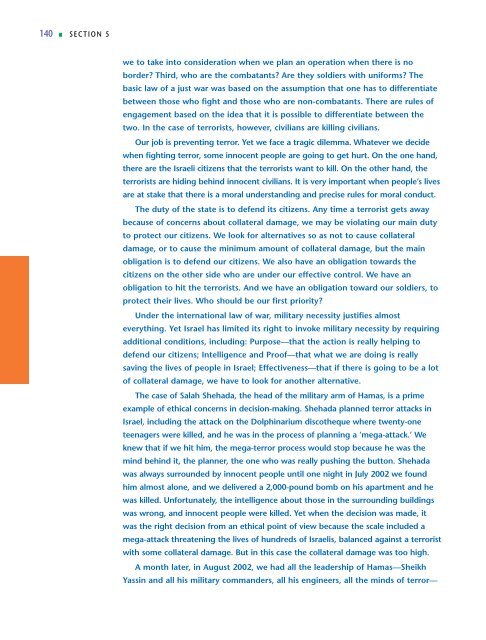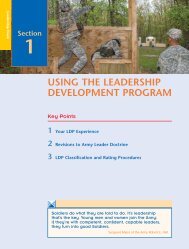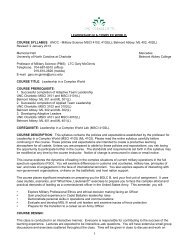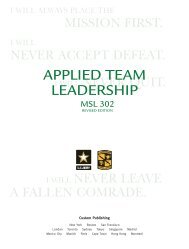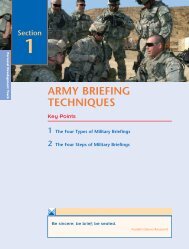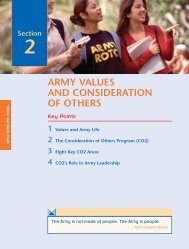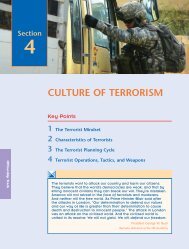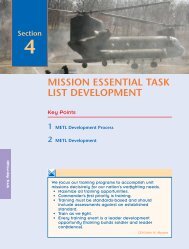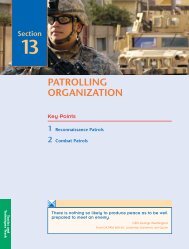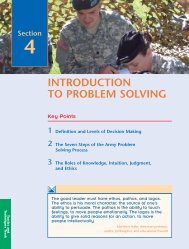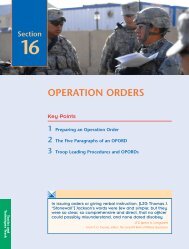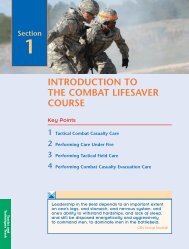<strong>Army</strong> <strong>Leader</strong> <strong>Ethics</strong> ■ 139If legal limits are clearly in question, the <strong>Army</strong> Values bind everyone involved, regardlessof rank, to do something about it. <strong>Army</strong> leaders have a responsibility and a duty to researchrelevant orders, rules, and regulations, and to demand clarification of orders that could leadto criminal misinterpretation or abuse. Ultimately, <strong>Army</strong> leaders must accept theconsequences of their actions.Living the <strong>Army</strong> Values and acting ethically is not just for generals and colonels. Ethicaldecisions apply every day in military units and in offices on <strong>Army</strong> installations across theworld. They include decisions that can directly affect the lives of Soldiers in the field, innocentnoncombatants, <strong>Army</strong> civilians, as well as American taxpayers. All <strong>Army</strong> leaders need tomake value-based, ethical choices for the good of the <strong>Army</strong> and the nation. <strong>Army</strong> leadersshould have the strength of character to make the right choices.The Ethical Decision Making Process<strong>Army</strong> leader character consists of three interacting factors: <strong>Army</strong> Values, empathy, andthe Warrior Ethos. People enter the <strong>Army</strong> with the values and beliefs they’ve developedover the course of a lifetime. But those are just the starting point for further characterdevelopment. <strong>Army</strong> leaders continuously develop the <strong>Army</strong> Values in themselves and intheir subordinates. This isn’t just an academic exercise or another mandatory training topicto address once a year. Your character affects how you lead and how willing Soldiers willbe to follow you. If you lack credibility of character in making ethical decisions, you willlose the trust of the men and women you seek to lead.<strong>Army</strong> Values remind us and tell the rest of the world—the civilian government weserve, the nation we protect, even our enemies—who we are and what we stand for. Thetrust Soldiers and DA civilians have for each other and the trust the American peoplehave in us depends on how well we live up to <strong>Army</strong> Values. They are the fundamentalbuilding blocks that enable us to discern right from wrong in any situation. <strong>Army</strong> Valuesare consistent; they support one another. You cannot follow one value and ignore another.Ethical DilemmasIn certain situations, <strong>Army</strong> Values may conflict with each other or some other valid factorsuch as rules, orders, or the situation itself. An ethical dilemma is a situation where youfind that two or more factors conflict as you try to decide the “right” course of action. Sohow do you decide which “right” is “right”?Your character affectshow you lead and howwilling Soldiers will be tofollow you.The ethical decisionmaking processrepresents how a leaderuses ethical reasoning toapply <strong>Army</strong> Values in hisor her day-to-dayactivities.ethical dilemmaconflict of two or morefactors or values indeciding the right courseof actionEthical Dilemmas in Fighting TerrorismMaj. Gen. Amos Yadlin was Israel’s military attaché to Washington and formerhead of the Israeli Defense Force (IDF) National Defense College and deputycommander of the Israel Air Force. In 2003 Maj. Gen. Yadlin headed an IDF teamto outline new principles of war against terror. Here are some of his concerns.In postmodern warfare, every fundamental concept of war has changed. First,who is the enemy in this case? Normally, a state is the enemy, or a well-definedorganization such as the PLO. In this war, no state or organization is accountable.Second, wars in the past happened at the front line. Suddenly there is nodefined front, no defined border. The terrorists are all over. What kind of rules are
140 ■ SECTION 5we to take into consideration when we plan an operation when there is noborder? Third, who are the combatants? Are they soldiers with uniforms? Thebasic law of a just war was based on the assumption that one has to differentiatebetween those who fight and those who are non-combatants. There are rules ofengagement based on the idea that it is possible to differentiate between thetwo. In the case of terrorists, however, civilians are killing civilians.Our job is preventing terror. Yet we face a tragic dilemma. Whatever we decidewhen fighting terror, some innocent people are going to get hurt. On the one hand,there are the Israeli citizens that the terrorists want to kill. On the other hand, theterrorists are hiding behind innocent civilians. It is very important when people’s livesare at stake that there is a moral understanding and precise rules for moral conduct.The duty of the state is to defend its citizens. Any time a terrorist gets awaybecause of concerns about collateral damage, we may be violating our main dutyto protect our citizens. We look for alternatives so as not to cause collateraldamage, or to cause the minimum amount of collateral damage, but the mainobligation is to defend our citizens. We also have an obligation towards thecitizens on the other side who are under our effective control. We have anobligation to hit the terrorists. And we have an obligation toward our soldiers, toprotect their lives. Who should be our first priority?Under the international law of war, military necessity justifies almosteverything. Yet Israel has limited its right to invoke military necessity by requiringadditional conditions, including: Purpose—that the action is really helping todefend our citizens; Intelligence and Proof—that what we are doing is reallysaving the lives of people in Israel; Effectiveness—that if there is going to be a lotof collateral damage, we have to look for another alternative.The case of Salah Shehada, the head of the military arm of Hamas, is a primeexample of ethical concerns in decision-making. Shehada planned terror attacks inIsrael, including the attack on the Dolphinarium discotheque where twenty-oneteenagers were killed, and he was in the process of planning a ‘mega-attack.’ Weknew that if we hit him, the mega-terror process would stop because he was themind behind it, the planner, the one who was really pushing the button. Shehadawas always surrounded by innocent people until one night in July 2002 we foundhim almost alone, and we delivered a 2,000-pound bomb on his apartment and hewas killed. Unfortunately, the intelligence about those in the surrounding buildingswas wrong, and innocent people were killed. Yet when the decision was made, itwas the right decision from an ethical point of view because the scale included amega-attack threatening the lives of hundreds of Israelis, balanced against a terroristwith some collateral damage. But in this case the collateral damage was too high.A month later, in August 2002, we had all the leadership of Hamas—SheikhYassin and all his military commanders, all his engineers, all the minds of terror—


